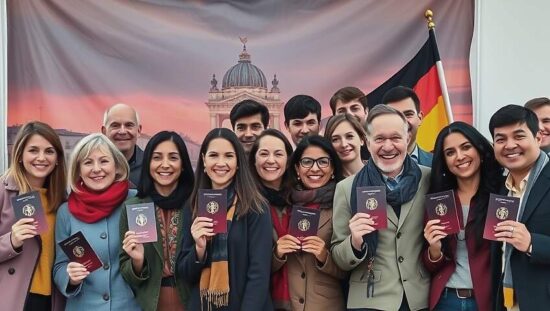Germany Sees Record Number of Naturalizations in 2024, with 249,901 People Gaining Citizenship
According to data from 13 of Germany’s 16 federal states, a record number of naturalizations were granted in 2024, with a total of 249,901 people gaining German citizenship. This is a significant increase from the 200,095 people who were naturalized in 2023, which was previously the highest number on record.
Several states, including Baden-Württemberg, Hesse and North Rhine-Westphalia, provided the data to the German newspaper Welt am Sonntag, which reported on the figures. Three states, however, did not provide the data: Lower Saxony, Saxony-Anhalt and Schleswig-Holstein.
Experts attribute the increase in naturalizations to the new citizenship law, which allows people to apply for citizenship after five years of residence in Germany, rather than the previous eight years. Many people who arrived in Germany during the refugee crisis of 2015 and 2016 are now applying for citizenship or have already done so.
Additionally, the new law no longer requires the renunciation of previous citizenship, which is also a motivator for some people to apply for German citizenship. The data from several states shows that a significant number of Syrian and Turkish citizens are naturalizing, with many having lived in Germany for longer than the legally required period. For example, the average duration of stay for naturalized citizens in Baden-Württemberg was 14.1 years.
However, the so-called “turbo-naturalizations” after three or four years of residence are rare in practice. Eight states provided the Welt am Sonntag with the corresponding numbers, with only a few instances of such naturalizations reported. In contrast, Berlin registered 382 accelerated naturalizations, the only three-digit number among the states.
The president of the German County Association, Achim Brötel, commented that the accelerated naturalizations are an example of how symbolic politics does not always align with real-life circumstances. He emphasized the importance of meeting the high standards of self-sufficient income and German language proficiency, which are essential for a successful integration.
The government’s decision to introduce the accelerated naturalizations in June 2024 was met with criticism and the new government is now planning to abolish the rule. The Interior Minister, Alexander Dobrindt, stated that the measure had created a “pull factor” that attracted people to Germany and the new government aims to eliminate this attraction.





